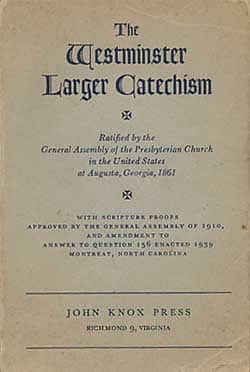STUDIES IN THE WESTMINSTER SHORTER CATECHISM
by Rev. Leonard T. Van Horn
Q. 55. — What is forbidden in the third commandment?
A. — The third commandment forbiddeth all profaning or abusing of anything whereby God maketh himself known.
Scripture References: Mal. 2:2; Isa. 5:12; Ps. 139.20; James 1:13; Matt. 26:74.
Questions:
1. In what ways does God make Himself known?
As we learned in the prior commandment, He makes Himself known by His names, titles, attributes, ordinances, word and works.
2. How are these ways profaned or abused by man?
They are abused “by blasphemy, perjury, sinful cursings, oaths, vows and lots” (Larger Catechism, Question 113)
3. How can man profane God’s names, titles and attributes?
Man can profane these when he thinks hatred toward God; when he speaks irreverently toward God; when he swears by the name of God in a wicked way; when he blasphemes the name of God; when he curses himself or others in the name of God; when he uses the the name of the Lord in superstitious ways.
4. How can man profane His ordinances?
Man can profane the ordinances of God by being irreverent or irreverent or irregular in His attendance upon them; by attending to them not in the spirit but being in the flesh by allowing His mind to wander; by having a false and insincere profession of their faith in Christ and still partaking of them.
5. How can man profane His word?
Man can profane the word of God by denying parts of the Word or by perverting it; by teaching false doctrine as it pertains to the Word; by misapplying the Word of God.
6. How can man profane His works?
Man can profane His works by using His body in the wrong way; by being forgetful of God’s mercy and wonderful works to the children of men; by murmering against the Lord in the midst of adversity.
TAKING HEED TO THE WORD
One of the greatest responsibilities-and privileges-of the born again believer is that of taking heed to the Word. James tells us, “Let every man be swift to hear …. ” (James 1:19). This particular commandment, the third, is pertinent to us as each Lord’s Day and each Wednesday evening we go to hear the Word of God preached. Jeremy Taylor once said, “When the word of God is read or preached to you, be sure you be of a ready heart and mind, free from worldly cares and thoughts, diligent to hear, careful to mark, studious to remember, and desirous to practice all that is commanded, and to live according to it; do not hear from any other end but to become better in your life, and to be instructed in every good work, and to increase in the love and service of God.” (The Rule and Exercises of Holy Living, p. 181).
Many times the Christian misses what the Lord has for him In the worship service because he comes unprepared. In the same first chapter of James there is a suggested outline regarding the duties of the Christian in his attendance at the house of God. Verse 21 tells hlm of his duties before the sermon: that Gf laying apart anything of filth, of sin. Verse 21 also tells him of his duties during the sermon: that of receiving with meekness the engrafted (implanted) word. Verse 22 tells him of his duties after the sermon: that of being a doer of the Word and not a hearer only. God’s people will receive far more benefit from the preaching of the word of God, and will be able to apply it more effectively, if they have prepared their hearts beforehand for the hearing of the word.
How do we prepare ourselves for the hearing of the Word? So many times on the Lord’s Day our preparation consists of reading the Sunday paper, of sleeping late, of neglecting prayer and study of the Word. It is to be wondered what the result would be if the church on the Lord’s Day were filled with Christians who had actively prepared themselves for the preaching of the Word. Christians who had come with willing and obedient heart; with a deep-seated desire to hear the Word; with hearts in tune with the Almighty, Sovereign God. Indeed, the result would be a doing of the duties set forth in the Word, in the power of the Holy Spirit, to the glory of God.
Published By: The SHIELD and SWORD, INC.
Vol. 4 No. 51 (March, 1965)
Rev. Leonard T. Van Horn, Editor

